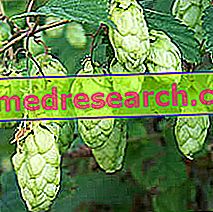
Scientific name
Humulus lupulus
Family
Cannabaceae
Origin
Central Europe, Nordic countries
Used Parts
Drug given by cones
Chemical constituents
- Flavonoids;
- Essential oil (containing a large variety of compounds, including myrcene, umulene, caryophyllene, tannins and xanthumol);
- Alpha-bitter acids, among which we remember the humulone, the coumulone and the adumulone;
- Beta-bitter acids, among which we find the lupulone, the colupulone and the adlupulone;
- Tannins;
- Phytoestrogens;
- Phenolic acids (including caffeic acid and chlorogenic acid).
Hops in Herbalist: Properties of Hops
Hop, used in the production of beer, is also used in folk medicine especially as a sedative. As such, the hop enters the composition of some herbal tea blends prescribed by the same National Galenical Formulas: lemon balm herbal tea and valerian herbal tea.
Biological activity
As mentioned, hop has sedative properties that are used in phytotherapy to combat anxiety, restlessness, nervous excitement and insomnia. These activities have been confirmed by several clinical studies, so that the use of the plant for the treatment of the aforementioned disorders has been officially approved. The lupulone and the humulon seem to be responsible for the sedative action exercised by the hops, more precisely the products deriving from their oxidation, among which 2-methyl-3-buten-2-ol stands out.
The potential antitumor activities that appear to be exerted by the phytoestrogens contained within it were also investigated. In fact, a study carried out on this subject stated that hops can inhibit the growth of tumor cells through the estrogenic effect exerted by phytoestrogens present within the plant itself.
Another in vitro study, on the other hand, has shown that flavonoids - especially xanthumol - are able to exert an anti-proliferative action against malignant cells of breast, ovary and colon cancers.
Another study, still conducted in vitro, has instead shown that the humulon is able to inhibit the development of malignant cells of acute monoblastic leukemia.
However, despite the results obtained, the aforementioned medical applications of hops have not been approved, as further and more in-depth studies are needed.
Hops against anxiety, agitation, restlessness and insomnia
Thanks to the sedative action exerted by lupulone and humulone, hops can be used as a remedy for the treatment of disorders such as anxiety, restlessness, nervousness, agitation and insomnia.
For the treatment of the aforementioned conditions, the hops are taken internally in the form of a liquid extract, a tincture or other preparations for oral use.
When using the 1: 1 liquid hop extract (using 45% V / V ethanol as an extraction solvent), the usual recommended dose is about 0.5-2 ml of product.
When, on the other hand, dyeing is used (ratio drug / solvent 1: 5, using ethanol at 60% V / V as extraction solvent), the dose usually used is about 1-2 ml of product.
Hops in folk medicine and homeopathy
In folk medicine, hops are used internally for the treatment of inflammation of the intestinal mucosa, neuropathic pain and priapism; while it is used externally to treat skin ulcers and abrasions.
Other unapproved uses of hops include taking it internally as a bitter and stomachic remedy to stimulate the appetite and the secretion of gastric juices, therefore, to promote digestive processes.
Moreover, hops are exploited by homeopathic medicine, in which it is used as a remedy against agitation, insomnia, and spermatorrea.
Generally, homeopathic hops can easily be found in the form of granules. The dose of remedy to be taken can be different from one individual to another, also depending on the type of homeopathic dilution that is intended to be used.
Side effects
Excessive use of hops - especially if continued for long periods - can cause side effects, such as dizziness and cognitive changes.
In addition, hops can cause allergic reactions, even serious ones, in sensitive individuals.
Warnings
Among the constituents are phytoestrogens, including 8-prenylnaringenin, but there are still no data on its use in menopausal disorders, nor are there standardized hop extracts in phytoestrogens.
Contraindications
Avoid the use of hops in case of hypersensitivity to one or more components.
The use of hops is also contraindicated in patients suffering from depression and during pregnancy.
Finally, some authors state that the use of hops is also contraindicated in women with estrogen-dependent breast cancer (due to the phytoestrogens contained in the plant).
Pharmacological Interactions
- possible interaction with psychotropic drugs and alcohol due to the sedative effect;
- hormonal therapies: possible interaction due to the estrogenic effect;
- in the animal, hops interact with barbiturates, increasing sleep time.



